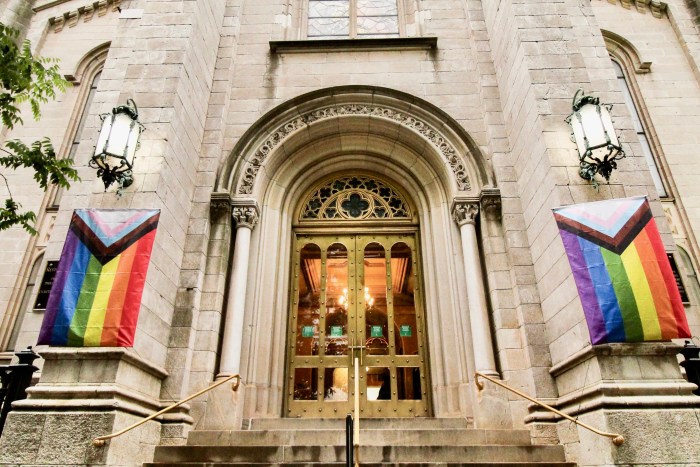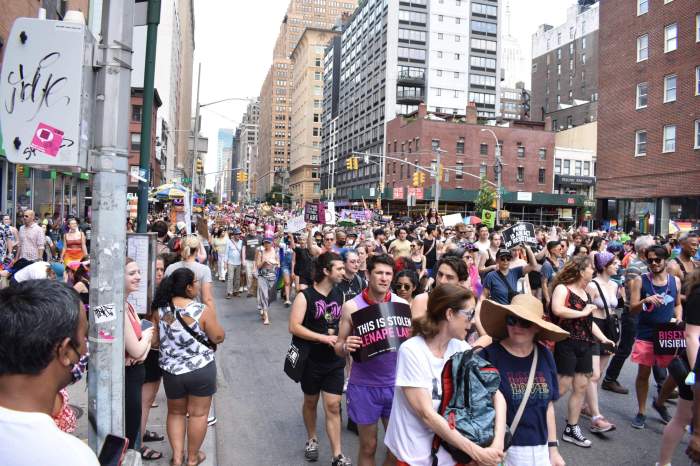By Patrick Hedlund
Streit’s stays put
Streit’s will continue making matzo at its longtime Lower East Side factory after the company decided to back off on the sale of its historic headquarters at Rivington and Suffolk Sts.
The Streit family, which originally moved into the first of four former tenement buildings at the site in 1925, put the properties on the market for $25 million in late 2007. After turning down a $20 million offer five months ago, the company’s shareholders unanimously agreed that economic conditions had reduced the portfolio’s value too much to consider selling. Potential buyers had indicated an interest in residential development at the site.
“We’re here and staying in the Lower East Side for now,” said Alan Adler, whose father and grandfather founded the business, which began as a mom-and-pop bakery on Pitt St. in 1914. “We’re going to stick out here as long as we possibly can.”
Streit’s currently packages its matzo and related dry products at a warehouse in New Jersey, where Adler said he would ultimately like to consolidate all operations into a single facility. But that plan might have to remain on hold several years, he added, when the market hopefully has had enough time to fully rebound.
“The dream would be a 100,000-square-foot, single-story building in an industrial complex,” Adler told Mixed Use. Their current one six-story, two five-story and one four-story L.E.S. buildings only provide about 48,000 square feet.
Adler believes the buildings’ worth has dropped to about $14 million to $15 million, and that it will take years to bring the real estate market back to its former heights.
“I will guesstimate that we will do this for five years, and we’ll revisit [selling],” he said, noting that maintenance of the company’s ovens will continue as needed. “If we have to, we’ll just keep rebuilding.”
Business at Streit’s has been brisk with Passover approaching, and over all, the company has remained relatively insulated from the economic meltdown.
“The demand is there for both Passover and daily matzo,” Adler said. “Thank God, we’re one of the few businesses in the economy that’s doing very well.”
Finally time for Topshop
One of Downtown’s most highly anticipated — and delayed — retail openings will come at last on April 2 with the New York launch of Topshop, the British import whose announced debut sent shoppers’ tongues wagging last year.
The resurgent U.K. retailer’s first American foray, on Broadway at Broome St. in Soho, will offer the clothier’s second-largest location next to its flagship London outpost. The planned New York unveiling had weathered a series of setbacks since news of the store’s arrival broke in late 2007. Two previous launch dates were postponed due to complications during the 40,000-square-foot space’s build-out. According to reports, the much-hyped store will be spread out over four floors that include a shoe lounge, V.I.P. suite, D.J. booth and innovative design elements throughout.
Topshop made headlines two years back when supermodel Kate Moss introduced a line for the store, similar to the way chains like H&M and Target have brought in reputable designers to appeal to the city’s more fashionable clientele.
“I think the anticipation has built up,” said Faith Hope Consolo, chairperson of Prudential Douglas Elliman’s Retail Leasing and Marketing Sales Group, citing the store’s European panache. “I think the consumers are willing to open up their pocketbooks to something different.”
Lower Broadway has turned into ground zero for foreign fashion imports, including the openings of Uniqlo and Muji just blocks away, and Consolo said Topshop’s entry will introduce even more quality to the area. Calling it the “most exciting shop opening in Soho since Bloomingdale’s,” she added that Broadway between Houston and Canal Sts. will remain in a state of perpetual retail growth.
“You really have a contingency of a lot of great stores in one neighborhood, and Topshop is just going to be the icing on the cake,” she said. “They definitely will be a traffic driver.”
Tapas take a dive
An as-yet-to-be-named tapas restaurant will open in the space of the popular East Village bar Tribe, which recently closed after a decade at the corner of First Ave. and St. Marks Place.
Danny Rivera, owner of the nearby Crooked Tree crêperie, plans to launch his Spanish-American tapas and wine bar by mid-June after extensive renovations to the space.
“I’m a guy from the neighborhood; I’ve worked and lived here for over 10 years,” said Rivera, whose cafe around the corner has been open for a decade. “My plan is to make the place for the community.”
Dr. Tara Allmen, who owns the five-story building housing the new restaurant, explained that Tribe had become “derelict,” even though it continued to draw loyal customers to the lounge-like, 1,000-square-foot space for a decade.
The bar’s owner, the senior partner in a group that operates four other venues in Manhattan, enjoyed a sweetheart deal during the last 10 years, Allmen said. But when the tenant’s lease recently came up, she more than doubled the price to bring it up to market rate, and decided to take things in another direction.
“I’m replacing a dive bar with an elegant wine bar and tapas place,” Allmen added, claiming that the former operators did not maintain proper upkeep of the space. “Do I think it’s a plus to have a higher-class place in the East Village? I would say it’s a bonus to have wonderful, quality places in the East Village.”
History dictates that dive bars have sometimes outlasted fashionable restaurants in the neighborhood. But Rivera has already proven his longevity at the cafe — and expects an even longer run with this new venture.
“It’s a neighborhood guy that’s going to open up in the neighborhood,” he said. “It’s in the hands of people in the neighborhood. It’s not going to a sushi spot or a bank.”
mixeduse@communitymediallc.com

































